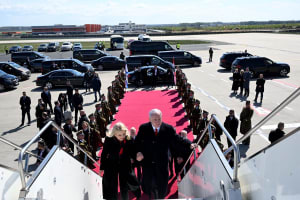Committed to 'responsible innovation and human rights values,' Israel signs global treaty to address AI risks

Israel was one of the co-signatories of the first global treaty addressing the risks of artificial intelligence. The treaty, spearheaded by the Council of Europe, was signed by 57 nations, including the United States, on Thursday.
“Israel’s signing of the first global convention for artificial intelligence emphasizes our commitment to responsible innovation and human rights values,” said Israeli Innovation, Science and Technology Minister Gila Gamliel. “This convention places Israel as a full partner in the creation of international policy in the field in the coming years and will place us at the forefront of the world’s advanced countries.”
The treaty aims to establish global guidelines and principles around the use of AI, ensuring that its application aligns with human rights, democracy and the rule of law. Once ratified, the signatories will be obligated to ensure that AI systems are not used to “undermine the integrity, independence and effectiveness of democratic institutions and processes, including the principle of the separation of powers, respect for judicial independence and access to justice.”
Israeli AI expert, Prof. Amnon Shashua, co-founder of Israeli startup AI21 Labs, spoke at a conference in Tel Aviv last week, emphasizing that while AI is advancing rapidly, it does not yet amount to a "revolution."
“It is a technological wave that has the potential to imitate human intelligence in solving complex problems in all areas of human knowledge, instead of human experts,” Shashua said. “Among those who are involved in working on AI advanced models, there is a sentiment that it is coming around the corner.”
“The very fast advancement of these models creates a sentiment that in the near future, these systems will not only be able to summarize articles but solve problems like a human expert, and then everything changes meaning that the relationship between us and machines is going to undergo a dramatic change,” he added.
While AI is anticipated to become a central force in future technology, transforming the world as we know it, many fear its significant risks, which could lead to catastrophic outcomes, including severe harm and the erosion of democracy and human rights.
While AI is expected to become a focal point of future technology, transforming the world as we know it, many fear its significant risks, including significant harm and the undermining of democracy and human rights.
The CEO of OpenAI, Sam Altman, has called for government intervention to prevent potential negative consequences of the future AI revolution. He has advocated for the creation of an international monitoring body, along the lines of the United Nations nuclear agency, to regulate AI developments
Experts fear that AI could be abused in critical infrastructure, education, human resources, and public order, including the creation of deepfakes, leading to false claims online, including about the Holocaust, violations of copyright and the manipulation of people.
In Israel, there have been recent concerns that the Jewish state could fall behind the AI race because of the war in Gaza and the ongoing conflict with Iran's terror proxies in the region.
“Despite the current war and all the pain and challenges that it brings, we need to remain attuned to, and involved with, international processes and organizations,” said Israeli Deputy Attorney General Gilad Noam.
“Just as importantly, we want to signal to our allies and friends across the globe that we share a common desire, namely: to foster innovation while protecting human rights.”

The All Israel News Staff is a team of journalists in Israel.














